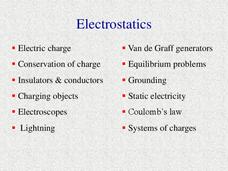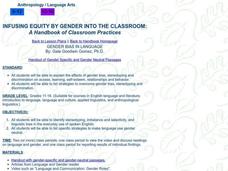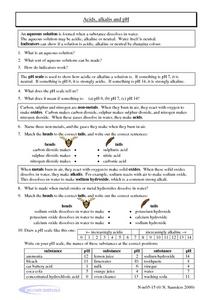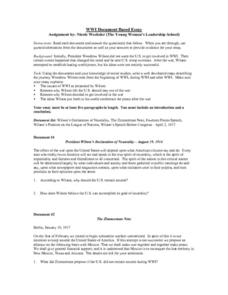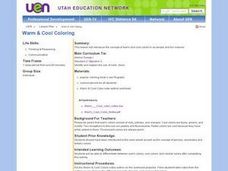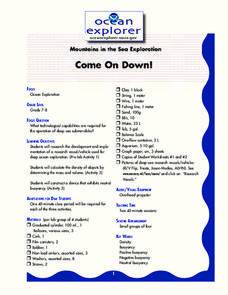Novelinks
Running Out of Time: Anticipation Guide
Get your class ready to read with this anticipatory set for Running Out of Time. Small groups each consider one thought-provoking statement. After each group comes to a consensus, the whole class participates in sharing ideas and voting...
Close Up Foundation
Teach the Vote
Why is voting important? A social studies unit presents a non-partisan approach to the importance of voting, to voting laws and procedures, and to resources that voters need to become informed voters.
Urbana School District
Electrostatics
Why did lightning shock the man? Because it didn't know how to conduct itself. Presentation covers electric charges, insulators, conductors, electroscopes, lightning, generators, grounding, static electricity, and more. Presentation...
NASA
Christa's Lost Lesson: Effervescence
How are chemical reactions affected by gravity? Learners explore the phenomenon of effervescence as part of the Christa's Lost Lessons series. They compare findings in an experiment on effervescence to a video of a similar experiment in...
National Institute of Open Schooling
Radioactive Pollution
Radioactive pollutants can enter the body through ingestion, inhalation, absorption, or injection. The last lesson in a series of 36 introduces pupils to radioactive pollution. They study its sources, both natural and man-made, its...
Constitutional Rights Foundation
The Cold War: How Did It Start? How Did It End?
What is the difference between a Cold War and a Hot War? Scholars research the beginning of the Cold War. They analyze diary entries as well as excerpts from various events during the 45-year standoff. To finish, they prepare final...
Curated OER
What Are Acids And Bases?
In this acids and bases worksheet, students will complete a Venn diagram by comparing and contrasting the characteristics of acids and bases.
Curated OER
Antibodies and Antigens: Fitting Together
Using basic matching, aspiring biologists connect types of antigens with the antibodies that fight them. Provide ample instruction prior to assigning this one-sheet resource. Require students to explain in writing how each antibody works...
American Chemical Society
Carbon Dioxide Can Make a Solution Acidic
Can your breath change the acidity in a liquid? A lesson begins with a demonstration that proves it can. Then scholars perform an experiment to determine if other gases can change the pH of liquids. Finally, they research how this...
Curated OER
pH Pre-Lab: Acids and Bases
In this chemistry lab, high schoolers determine whether or not their saliva is acidic, basic, or neutral. After completing their test, they answer 6 analysis questions.
Curated OER
Water Ph
Eighth graders study the concepts of acids, bases, salts and neutralization. They discuss steam adoption program, acid rain and other ecological implications. They use indicators to obtain pH values of household chemicals and to...
Creative Chemistry
Acids, Alkalis, and pH
For this pH activity, high schoolers determine how indicators work and what the pH scale is used for. Students learn what happens when non-metals burn in air and metal oxides dissolve in water. This activity has 10 problems to solve.
Curated OER
pH
Students test the pH of various solutions. In this pH lesson, students use litmus paper to test the pH of household solutions. They compare their results with book charts.
Curated OER
HOW IS PH DETERMINED?
Students estimate the pH based on the use of an unknown substance, determine whether an unknown substance is acid, base or neutral, and evaluate, by the pH determination, which of the unknowns is the strongest acid or base.
Curated OER
Acids and Bases
Students study acid and bases and how they fall on the pH scale. In this solutions lesson students complete a lob activity using litmus then fill out a data table.
Curated OER
WWI Document Based Essay
Learners read various primary source documents on World War I. After reading each document, they answer discussion questions. Using the internet, they identify the causes of World War I as layed out by President Wilson and his reasons...
Curated OER
Static Electricity
In this static electricity worksheet, pupils use balloons, flannel cloths, and a plastic bag to create static electricity. Students then fill out 3 tables and answer 3 short answer questions.
Curated OER
Warm & Cool Coloring
Students identify, explain and use the basic elements of design. They explore the concept of warm and cool colors in as simple and fun manner. They label one coloring book picture warm and the other picture cool. They color the...
Curated OER
Electricity
Middle schoolers watch instructor present demonstrations of the basic principles of static electricity, and then conduct some of their own experiments. In small groups, students build simple circuits, using batteries, to try to light up...
Curated OER
Come On Down!
Young scholars research the implementation of a research vessel used for ocean exploration. In buoyancy lesson students will construct a device that shows neutral buoyancy.
Curated OER
Cutting Positive and Negative SYMMETRICAL SHAPES
Students cut intricate symmetrical shapes on the fold. Also, they identify positive and negative shapes and warm, cool and neutral colors. Finally, they glue shapes to create a pleasing design.
Curated OER
pH
Learners use a Colorimetric test to measure pH and gain the importance to life in an aquatic ecosystem pH is. They explore the dramatic effect pH level can have on a water body. Students test the pH level of many water samples.
Curated OER
Balance Equation
In this balance equations worksheet, students write the charge balance equation for different compounds dissolved in water. Students rank the concentrations of ions and neutrals at equilibrium for solutions formed. This worksheet has 21...


